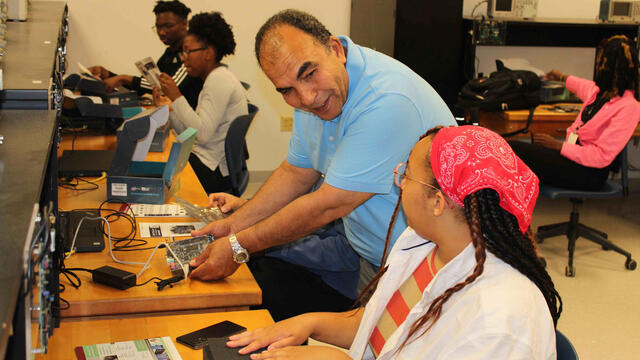
Computer Hardware Technology Minor

Dive into the future of tech with our online 14-credit Minor Program in Computer Hardware Technology, offered by the Semiconductor Education and Research Program at the College of Engineering, Science, Technology, and Agriculture!
Crafted in collaboration with industry experts at Intel, designed to combat the workforce shortage in the microelectronics and semiconductor industry. Our program delves into critical topics, including Circuit Analysis, Digital Systems, Microprocessors, Manufacturing Science and ERP, VLSI Design and Fabrication, and Artificial Intelligence, to prepare you for a rewarding career in this high-demand sector. Join us to amplify your career prospects and contribute to the growth of the microelectronics industry.
Begin your journey today with our Minor Program in Computer Hardware Technology – your gateway to an exciting tech career!
Minor in Computer Hardware Technology Courses
Our 14-credit Minor in Computer Hardware Technology features 11 credits in mandatory courses and 3 credits in elective courses.
Mandatory courses (11 credits):
- INT2311: Circuit Analysis I (3)
- INT3520: Digital Systems (4)
- INT3630: Microprocessors (4)
Elective courses (3 credits):
- CPS2271: Data Structures (3)
- CPS3330: Data Analysis & Visualization (3)
- CPS4210: Artificial Intelligence (3)
- INT4220: VLSI Design and Fabrication (4)
- INT4230: Manufacturing Science and ERP (3)

Our Computer Hardware Technology program welcomes individuals from diverse backgrounds, including high school graduates, university students, and those seeking a career change. This program provides a strong foundation in microelectronics and invaluable job opportunities with industry-leading companies like Intel.
Mohammadreza Hadizadeh, Ph.D.Program Director
Computer Hardware Technology admissions requirements and financial aid

-
At Central State University, we are dedicated to making your education in semiconductor processing financially achievable. We proudly offer a 100% textbook-free program through the use of open educational resources. For those who meet the requirements, financial aid options are available. Our financial aid advisors are ready to guide you through the process and answer any queries you may have.
-
Admission requirements for the Computer Hardware Technology program include the following:
- Applicants must have a high school GPA of 3.0 or higher and a passing grade in a college-level mathematics course (such as college algebra or higher).
- Alternatively, a cumulative college-level GPA of 3.0 or above from an accredited institution will also be considered.
-
Mandatory courses (11 credits)
INT2311: Circuit Analysis I: Basic circuit and troubleshooting techniques for DC circuits with an emphasis on industrial applications. Topics include the concepts of resistance, inductance, capacitance, power, nodal and mesh analysis, network theorem, RL, RC, and RCL analyses, and applications of operational amplifiers. Conventional and computer analysis techniques are utilized. Two lecture hours and two laboratory hours per week.
INT3520: Digital Systems: An introductory course on the basic tools for the analysis and troubleshooting of combinational and sequential logic as employed in digital computers and control systems. Topics include number systems, Boolean algebra, logic gates, combinational elements and circuits, synchronous sequential circuits, memory and storage devices, and programmable logic devices. Three lecture hours and two laboratory hours per week.
INT3630: Microprocessors: Introduction to the applications and development of software and hardware for effective use in interfacing microprocessor-based systems. Software topics include software architecture, software development tools and assembly language programming. Hardware topics include microprocessor architecture, bus timing and structure, memory, input-output ports interfacing, Interrupt handling, clock generation and timing. Three lecture hours and two laboratory hours per week. Prerequisite: INT 3520. Equivalent to TAG OET004.Elective courses (3 credits)
CPS2271: Data Structures: This course introduces students to data structures, including topics on linked lists, doubly linked lists, circular lists, stacks, queues, search strategies, hashing, internal sorting algorithms, external sort/merge algorithms, binary trees, B-trees, B+- trees, sequential files, random access files, file update algorithms, bit maps, and memory management algorithms.CPS3330: Data Analysis & Visualization: This course will introduce data analysis and visualization. The students will learn the key aspects of how to process, analyze and visualize data. Topics include describing and gathering data from various sources, such as raw text files, web APls, and data repositories, and statistical inferences. The course ill use existing computational tools and programming libraries to solve various problems. Towards the end, the course will cover how to handle powerful data analysis and visualization libraries, packages and tools that can be utilized in an array of domains and platforms. Prerequisite: MTH 2001 and CPS 3320.
CPS4210: Artificial Intelligence: Introduction to concepts, principles, challenges, and research in major areas of technical AI research. Areas of discussion include natural language and vision processing, machine learning, machine logic and reasoning, expert systems, and robotics.
INT4220: VLSI Design and Fabrication: VLSI (Very Large Scale Integrated) Systems Design and Fabrication (1, II, III, on-demand; 3) enables the design and analysis of full custom integrated digital systems, incorporated into a VLSI chip deploying design strategies for low power and high performance; in the context of the small group design team. Students will design and create components packaged into a full custom chip implemented in a clean room class of 1000 or 100 particles per cubic meter environment. Hands-on experience in the operation of a microfabrication laboratory will be provided. Encapsulation of design experience will be assessed through a detailed report and a short presentation to the class.
INT4230: Manufacturing Science and ERP: INT 4xxx. Manufacturing Science and Enterprise Resource Planning (I, II, III, On-demand; 3) Imparts the knowledge threads and competencies needed to outpace both change and the competition and enforce the development and implementation of next-generation advanced manufacturing sciences & technologies and supply chain best practices, through a culture of creativity, innovation, cost reduction, quality and safety enhancement, backed by research and scale-up introduction of new processes and products. The course teaches the skills needed to plan the resources of the enterprise to enable new materials, methods, systems, products, and processes to be realized. Emphasis is placed on the core fundamentals of effectively managing the organization's local and global supply chain logistics: to get the right product, at the right time, in the right place, in the right quantity, in the right condition, at the right price, to the right customer using the right array of enabling hardware and software advanced technologies. Prerequisite: INT2xxx: Statistical Process Control for Semiconductors.
Make your move
For additional information on the Computer Hardware Technology Minor Program, contact Dr. Mubbashar Khan at mkhan1@centralstate.edu.
Are you ready to advance the future of technology in this high-demand field? Apply today to join our next available certificate program.
Learn about continuing your education with online degree programs and certificates through Central State Global, the University's online division.